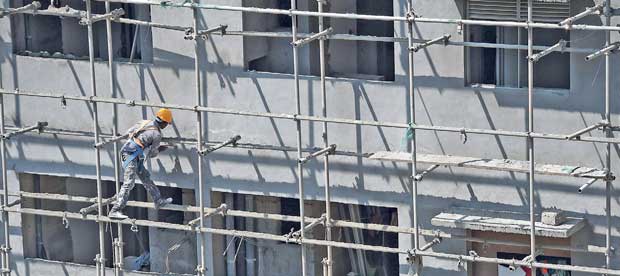21 Apr 2017 - {{hitsCtrl.values.hits}}

 AFP: Cheap Sri Lankan labour has built skyscrapers and condos across the Gulf for decades but now contractors at home are desperate for workers as the island nation experiences an unprecedented construction boom.
AFP: Cheap Sri Lankan labour has built skyscrapers and condos across the Gulf for decades but now contractors at home are desperate for workers as the island nation experiences an unprecedented construction boom.
The labour shortage has seen builders offer lavish incentives ranging from cash to vehicles to keep workers from heading overseas, and in some cases, illegally employ foreign tradesmen to man projects.
Sri Lanka was left with a massive reconstruction task at the end of the civil war in 2009, with large parts of the north left in ruins by decades of fighting.
Annual investment in new homes, roads and ports -- which has hovered at around Rs.600 billion (US $ 4 billion) in recent years -- is expected to almost triple to US $ 11.6 billion
in 2017.
But Sri Lanka needs 400,000 new workers -- a two-thirds jump from the existing levels -- to keep up with this surge, said Nissanka Wijeratne, the head of the Chamber of Construction Industry.
“We can’t get that many overnight and we will have to import. We are now facing a serious labour crisis,” he said.
Private contractors are going to extreme lengths to stop the flow of tradesmen heading to the Gulf for construction jobs, offering bonuses like motorcycles and cars to labourers who choose to work on projects
back home.
Social stigma
The government has taken a different approach and sought to put curbs on migration by raising the minimum wage requirements for workers heading overseas.
Under their proposal, Sri Lankans will be barred from going abroad for work unless they can show evidence of future earnings amounting to more than US $ 400 per month.
“We want to discourage those who go abroad for low pay. Some of these workers can get more money if they stay back in Sri Lanka,” Finance Minister Ravi Karunanayake told AFP.
But it is a risky strategy. Roughly one in 10 Sri Lankans work abroad and their remittances are the number-one foreign exchange earner for the island of 21 million.
The pool of money flowing home is growing, with Sri Lankans sending US $ 7.24 billion last year compared with US $ 6.98 billion in 2015.
The push to recruit local workers has also suffered due to a cultural stigma surrounding blue-collar labour, meaning that Sri Lankans living in the country often choose low-paying office jobs over better remunerated opportunities in masonry, carpentry and plumbing.
“There is a social perception about construction industry labour and that is why young people prefer public sector jobs even if they pay much less,” Wijeratne said.
“It is about social acceptance.”
‘Illegally employed’
The dearth has spurred some desperate contractors to look offshore themselves -- not for work but workers. The government estimates roughly 200,000 foreigners are employed illegally in the construction sector.
“Foreigners are illegally employed like this because we have a shortage of workers,” Urban Development Minister Champika Ranawaka said recently.
“I am proposing that the government come up with a policy on foreign workers to regularise this sector.”
One company, which declined to be identified, said it was employing foreign workers illegally but noted that many others were doing the same.
Chinese firms, unable to source local labour, have moved armies of construction workers to Sri Lanka to man their mega building projects.
Along one of Colombo’s main promenades, hundreds of Chinese workers wait every day for transport home after finishing a shift building towers for a new Shangri-La Hotel. Across the street, their countrymen toil on a vast US $ 1.4 billion real estate development.
Despite unemployment hovering at 4.5 percent at the end of 2016, the crippling labour shortage shows no signs of easing, raising fears that it will put the brakes on economic growth.
A large-scale Sri Lankan contractor said he had stopped accepting commissions to build condos because he couldn’t find tradesmen to finish the job.
The crisis is stretching beyond the construction sector. Sewage and water works projects are struggling to find labourers and are turning to neighbouring India for workers.
Sri Lanka’s lucrative garment industry is also facing a shortage of 50,000 machine operators and many companies have relocated to Bangladesh in search of cheap labour, according to
industry officials.
09 Jan 2025 8 minute ago
09 Jan 2025 2 hours ago
09 Jan 2025 2 hours ago
09 Jan 2025 2 hours ago
09 Jan 2025 3 hours ago